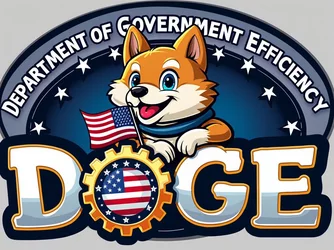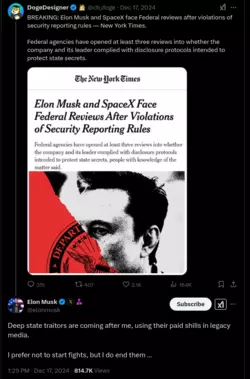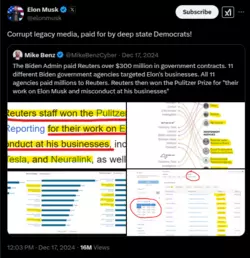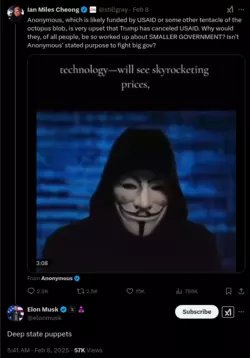
The Department of Government Efficiency, formally the United States DOGE Service (USDS), is hard to define. The USDS is formally a Federal advisory committee in the Executive Office of the President. But individuals formerly employed by DOGE Administrator Elon Musk have been given political appointments in the agencies; in this way, DOGE has grown beyond its legal advisory role and exercises direct power throughout the Executive Branch. Agency heads have been ordered to create DOGE teams within their agencies to facilitate DOGE's entrance and activities, and they have been ordered to give DOGE access to all unclassified data unless protected by law--and much data that is protected by law has almost certainly been handed over. Most of this work is done by unvetted or minimally vetted twenty-somethings (and a teenager) recruited from Musk's companies and Peter Thiel's Palantir via Discord. While Musk runs a public relations campaign on the social media site he owns, his minions have been rapidly working to deconstruct the Executive Branch of the Federal Government by harassing and inveigling employees into "voluntary terminations," exposing massive amounts of protected information on insecure information systems, degrading employee performance and agency resilience, and getting the government embroiled in numerous lawsuits. It will take years to perform a complete accounting of the damage DOGE has wrought, and is still working.
How did such a destructive organization come to be? The earliest public hints of DOGE were found on Twitter before the 2024 election. Musk solicited information on government waste from Federal employees (outside protected whistleblower channels), with the expectation that DOGE would act on these complaints. It was to be a sort of watchdog, bringing wasteful practices to the attention of authorities so they could be corrected. After the election, a fuller description of DOGE was published, and it went far beyond the initial watchdog idea.
DOGE THE SAVIOR
On November 20, 2024, the Wall Street Journal published an
opinion [
archive] by Elon Musk and Vivek Ramaswamy in which they laid out their plan for DOGE, making promises of moderate reform wrapped in legal authorities. It is the culmination of their pre-election messaging. But the Gospel of Doge and its reality have diverged so far that the Journal piece must be addressed almost line-by-line.
Our nation was founded on the basic idea that the people we elect run the government.
The first sentence is a gross misunderstanding of history and the Constitution. At the nation's founding, only one Federal body was elected by the people--the House of Representatives. Neither the Senate nor the President were popularly elected at the time, and the Supreme Court has always been appointed by the President with the advice and consent of the Senate. The civil servants, whom DOGE has targeted because they can't get what they want through elections, have never been elected by the people.
Most legal edicts aren’t laws enacted by Congress but “rules and regulations” promulgated by unelected bureaucrats—tens of thousands of them each year. Most government enforcement decisions and discretionary expenditures aren’t made by the democratically elected president or even his political appointees but by millions of unelected, unappointed civil servants within government agencies who view themselves as immune from firing thanks to civil-service protections.
It's true that civil servants promulgate rules and regulations under Acts of Congress and Executive Orders delegating that authority. It's not true that they view themselves as immune from firing. Valid reasons and processes for termination are written into law and regulation. OPM's
Fedscope shows about 11,000 employees are removed for discipline or performance each year. The numbers of employees removed for conduct prior to appointment or suitability, or who have resigned in lieu of termination, do not appear to be available. It is likely most "firings" are effected through resignation.

Musk and Ramaswamy seem to be making the case that civil servants should be fired for making "enforcement decisions and discretionary expenditures" that they disagree with, irrespective of their performance or discipline record. But the authority to make these decisions and the funds to expend were granted to the civil service by Congress, not by Executive fiat (such as the Executive fiat that created DOGE). Civil service protections exist to protect officials carrying out the lawful business of the government, even when the Executive would prefer that the lawful business of the government was otherwise.
The entrenched and ever-growing bureaucracy represents an existential threat to our republic, and politicians have abetted it for too long.
Note that Musk and Ramaswamy have so far been concerned with civil servants capable of making "enforcement decisions and discretionary expenditures," the "bureaucracy." We will see later that DOGE targets indiscriminately hundreds of thousands of non-bureaucrats who do not have the kind of authority Musk and Ramaswamy find objectionable. Nor does DOGE specifically try to reduce "entrenched" civil servants; it appears they are disproportionately attempting to remove probationary employees in their first one or two years of employment and remote workers hired for specialized skills.
That’s why we’re doing things differently. We are entrepreneurs, not politicians. We will serve as outside volunteers, not federal officials or employees.
Musk is reportedly serving as a special government employee and the Administrator of DOGE. Ramaswamy isn't serving in DOGE at all.
Unlike government commissions or advisory committees, we won’t just write reports or cut ribbons. We’ll cut costs.
DOGE is in fact an advisory committee, at least according to the law that purportedly authorizes its existence. It is not at all clear how Musk and Ramaswamy planned to cut costs without actually being Federal officials.
We are assisting the Trump transition team to identify and hire a lean team of small-government crusaders, including some of the sharpest technical and legal minds in America.
Most of these sharp minds were ultimately taken from management positions in Musk's companies, except for a team of recent college graduates or dropouts recruited over Discord. DOGE does not appear to have any legal minds at its beck and call, as will be clear when its communications and litigation record are examined.
The two of us will advise DOGE at every step to pursue three major kinds of reform: regulatory rescissions, administrative reductions and cost savings. We will focus particularly on driving change through executive action based on existing legislation rather than by passing new laws.
DOGE has not yet demonstrated any commitment to regulatory rescission, but perhaps they will rescind regulations after they have removed everyone who can enforce them. It has not focused on administrative overhead, but is reducing non-administrative personnel and even entire agencies. DOGE's antipathy toward passing laws through the representative democratic process does not need to be discussed.
Our North Star for reform will be the U.S. Constitution, with a focus on two critical Supreme Court rulings issued during President Biden’s tenure. In West Virginia v. Environmental Protection Agency (2022), the justices held that agencies can’t impose regulations dealing with major economic or policy questions unless Congress specifically authorizes them to do so. In Loper Bright v. Raimondo (2024), the court overturned the Chevron doctrine and held that federal courts should no longer defer to federal agencies’ interpretations of the law or their own rulemaking authority. Together, these cases suggest that a plethora of current federal regulations exceed the authority Congress has granted under the law.
This is an unwarranted conclusion. The Court decided its own standard of review was incorrect and it had been too deferential. It did not opine on the legitimacy of a "plethora" of regulations. Any specific regulation would have to be reviewed by the Court. It would no longer defer to agency interpretation, but it might find the agency's argument persuasive.
DOGE will work with legal experts embedded in government agencies, aided by advanced technology, to apply these rulings to federal regulations enacted by such agencies. DOGE will present this list of regulations to President Trump, who can, by executive action, immediately pause the enforcement of those regulations and initiate the process for review and rescission.
None of President Trump's
Executive Orders appear to effect the suspension or cancellation of Federal regulations on the advice of DOGE. However, Trump has directed the review of regulations outside the DOGE framework. The most salient action is
EO 14192, Unleashing Prosperity Through Deregulation, which does not mention DOGE at all. Maybe DOGE will propose some regulations to cancel later.
The number of federal employees to cut should be at least proportionate to the number of federal regulations that are nullified: Not only are fewer employees required to enforce fewer regulations
This is a complete non sequitur. Manning requirements don't come from the number of regulations.
Employees whose positions are eliminated deserve to be treated with respect, and DOGE’s goal is to help support their transition into the private sector. The president can use existing laws to give them incentives for early retirement and to make voluntary severance payments to facilitate a graceful exit.
DOGE's first attempt to reduce the Federal workforce was a legally dubious offer to give people seven or eight months of leave in exchange for resigning at the end. This is not found in existing law and may be a violation of it, though at this time there are no complaints relying on this theory. It did not offer voluntary early retirement until many people pointed out the legal difficulties in the original offer. It still has not offered voluntary separation incentive payments.
Conventional wisdom holds that statutory civil-service protections stop the president or even his political appointees from firing federal workers. The purpose of these protections is to protect employees from political retaliation. But the statute allows for “reductions in force” that don’t target specific employees.
Musk and Ramaswamy are right that a reduction in force (RIF) is possible. But a RIF is a lengthy, deliberate process with well-defined rules. The government has not initiated and, as far as I know, DOGE has not recommended a RIF.
With this authority, Mr. Trump can implement any number of “rules governing the competitive service” that would curtail administrative overgrowth
Musk and Ramaswamy cite "rules governing the competitive service," but only about two thirds of Federal civilians are in the competitive service. DOGE has also targeted the excepted service, such as USAID, which it has nearly annihilated. And it has used the Governmentwide Email System it created to contact, and prod toward resignation, members of the excepted service, and even contractors and employees of the other branches of government. I don't think they actually understand that there are different services in the government and they are governed by different rules.
Large-scale firings are almost certainly guaranteed to make the government less efficient, as the large amount of work left undone after those firings will eventually be farmed out to contractors. But this is a slow process, especially if contracting officers have been fired.
to relocation of federal agencies out of the Washington area.
About 80% of Federal employees are located outside the Washington area, but some are being forced to relocate there due to DOGE's stance on telework and remote work. More below.
Requiring federal employees to come to the office five days a week would result in a wave of voluntary terminations that we welcome: If federal employees don’t want to show up, American taxpayers shouldn’t pay them for the Covid-era privilege of staying home.
Telework and remote work are not a "Covid-era privilege." Telework in the Federal government goes back to at least
2003 [
archive]. The
Telework Enhancement Act of 2010 was a response to the 2010 blizzard called
Snowmageddon, which had profound impacts on the ability of Federal agencies to carry out their work. Countless offices were shut down and their employees placed on leave. Continuity of operations required rethinking the traditional model of a bunch of people sitting in an office building. The government has spent 14 years planning around telework and remote work. People were recruited to perform telework or remote work. Collective bargaining agreements were written for telework and remote work. Technology was purchased and configured for telework and remote work. Office spaces and parking spaces were provisioned with the expectation of hybrid work, or not at all for remote workers.
(Telework is working from an alternate work site while having a primary work site in a government building. Hybrid work usually refers to a schedule split between the two sites. Even when not hybrid, teleworkers are subject to recall to their primary work location. Remote work is when an employee's primary work site is their home and they have never been assigned to a government-owned or -leased location. They may live many hours from the closest agency location. Individuals or entire teams may be remote. Teleworkers and remote workers have the same performance standards as everyone else.)
Telework and remote work solved the Snowmageddon problem. As long as the internet was up, employees could work through weather closures. They had other benefits, too. Agencies were no longer forced to hire urban residents and those willing to relocate; they could hire more qualified candidates who lived farther from city centers and demanded a better work-life balance. Costs were reduced as agencies had fewer bodies to support on premises, fewer broken office chairs and clogged toilets and network connections and such. Employees who might have taken a sick day might choose instead to work through it from the comfort of their homes, and those who might have taken a day to oversee something at home would now only take as much time as needed, then return immediately to work. No one would ever be late due to traffic or the Metro single-tracking. Employees were more willing to work unusual hours, or spend uncompensated time on side projects. Productivity effects have been hard to untangle from macroeconomic factors, but a
Government Accountability Office review [
archive] of the FSA, IRS, USCIS, and VBA found many tasks were completed much faster as telework increased. Some tasks, such as meeting clients face-to-face, were not "portable;" but it should be noted veterans preferred meeting with VBA personnel through technology instead of traveling to a regional office. GAO also
reported [
archive] US workers generally were more productive and firms more resilient with telework.
The data show telework and remote work make the government more resilient, more available, and more productive. But DOGE intends to get rid of these work modalities. Because ultimately, DOGE isn't about making the government more efficient. It's about something else.
The federal government’s procurement process is also badly broken. Many federal contracts have gone unexamined for years. Large-scale audits conducted during a temporary suspension of payments would yield significant savings.
Possibly. But a suspension of payments would result in a suspension of work, causing interruptions from which it could be extremely difficult to recover. Why does a large-scale audit require shutting down payments? Inspectors general and the Government Accountability Office do not shut down programs while they are auditing them. I don't think Tesla stops building cars while PricewaterhouseCoopers does their thing.
The Pentagon recently failed its seventh consecutive audit, suggesting that the agency’s leadership has little idea how its annual budget of more than $800 billion is spent.
This is a common talking point, not exactly true but there are issues. A dozen zoomers recruited on Discord aren't going to fix them.
Critics claim that we can’t meaningfully close the federal deficit without taking aim at entitlement programs like Medicare and Medicaid, which require Congress to shrink. But this deflects attention from the sheer magnitude of waste, fraud and abuse that nearly all taxpayers wish to end—and that DOGE aims to address by identifying pinpoint executive actions that would result in immediate savings for taxpayers.
Identifying waste, fraud, and abuse is a very intensive task requiring the collection of evidence, interviews, expert analysis, and adjudication in some form. Again, this is not something a dozen zoomers can do. You can't grep for "fraud," cancel contracts, and replace the bad ones with an AI.
DOGE's creators promulgated incorrect statements about American history, the structure of government, and Federal workers to justify its existence. They made promises they would not keep or never intended to keep. Its real purpose is other than what was published in the Journal, and may perhaps be found in its leader's other statements.
DOGE THE AVENGER
DOGE's true purpose may be a reaction to the Deep State, a supposed unofficial organization within the civil service and military that persists through multiple administrations and is the real power, or one of the real powers, in the state. The phrase "deep state" originated in Turkey, but the nature of the Turkish deep state will not be addressed here. In the context of the United States, it seems to refer to two things: first, political appointees who "burrowed" into the civil service and continue political activities under civil service protection; second, legitimate civil servants who due to their policy preferences act independently of Executive Branch direction.
Appointees from both parties attempt to burrow, so if they are the Deep State, it is just as divided as the open state. Conversions from political appointment to nonpolitical require
OPM approval [
archive]. They grant permission about 80% of the time, comprising a little more than a hundred appointments through Trump's first administration. Some may slip through unnoticed if they successfully conceal their previous political appointment, and some probably burrowed in before OPM obtained jurisdiction in 2010. Nevertheless, burrowed political appointees are roughly divided between parties, and even within parties there is not complete agreement or coordination, so there is little reason to expect they form an organized Deep State.
Legitimate civil servants and military officers allowing partisan or political concerns to influence their decision-making may be more impactful. The most important for Trump are elements of the Russiagate hoax:
* FBI attorney Kevin Clinesmith falsified information in a FISA warrant application in order to conduct electronic surveillance of an individual associated with Donald Trump. He pleaded guilty and was
sentenced [
archive] to one year of probation and 400 hours of community service.
* FBI Special Agent Peter Strzok and his paramour, FBI lawyer Lisa Page, discussed something that would be like an "insurance policy" against Trump's election. In
lengthy testimony given to lawmakers, Page claimed the Crossfire Hurricane was "like" an insurance policy because it was unlikely Trump would be elected, but this is not entirely convincing. The Office of Professional Responsibility decided Strzok should be given a last chance agreement, demoted, and suspended for 60 days. Instead, he was
fired [
archive].
Trump's antipathy likely goes beyond individuals that harmed him. In an
interview with CNN, Stephen Miller alleged the career civil service is "overwhelmingly ... far left." (A Northwestern
study [
archive] found half were Democrats and Republicans wavered between one third and one quarter.) Miller also alleged 98% of USAID employees donated to Kamala Harris or another left-wing candidate. A few days later, DOGE
infiltrated [
archive] USAID, fired the Director and Deputy Director of Security, and got access to their systems. USAID has now been nearly annihilated. Whether Miller's characterization was accurate or not, this was clearly a political purge of career foreign service officers.
So Trump, at least, has some reason to be paranoid about a Deep State, is motivated to make Deep State accusations against perceived ideological opponents, and has used DOGE against those opponents. But what about Elon Musk? The entrepreneur sees the Deep State whenever the media or government says something unkind about him, and sometimes when they don't:
After Senator Todd Young joined the National Endowment for Democracy, Musk called him a "deep state puppet." He later deleted the post, but not before it was reported in the
media [
archive].
When the New York Times reported Musk's security violations, he
blamed Deep State traitors.

Likewise, when a news organization that received Federal contracts reported on Musk's businesses, he
blamed the Deep State.

Anonymous -- does everyone remember Anonymous? Anonymous is
puppets of the Deep State.

Musk thinks
non-binary theater kids are the Deep State.

Musk rarely posts his own thoughts on Twitter, preferring to react to other people's posts with emojis or one-word responses. It is likely he has
interesting-ed or
exactly-ed a lot more posts on the Deep State than he has written himself. And his clashes with government officials are well known. One such official was
FAA Administrator Mike Whitaker, who had the temerity to
fine [
archive] Musk for doing launches and storing rocket fuel in an unapproved manner. Even if he didn't say Deep State, he was thinking it.
Spoiler:
Whitaker resigned.
DOGE's proposed methods are inappropriate for increasing government efficiency, but they are ideal for obstructing, neutering, and destroying inconvenient government agencies. What could be more useful to Trump and Musk than obstructing, neutering, and destroying inconvenient government agencies, which they call the Deep State?
Next ... DOGE THE DESTROYER
With no real commitment to efficiency, and no clear definition of who or what the Deep State is, DOGE was left rudderless. And the rudderless ship plowed straight through the harbor, crashing into and sinking any bark in its way, and is probably going to explode Port Chicago-style any moment.
In my next effort post I will briefly cover how DOGE assembled its crack team, the legal rationale for its existence, its identifiable activities in Federal agencies, and the litigation against it.







